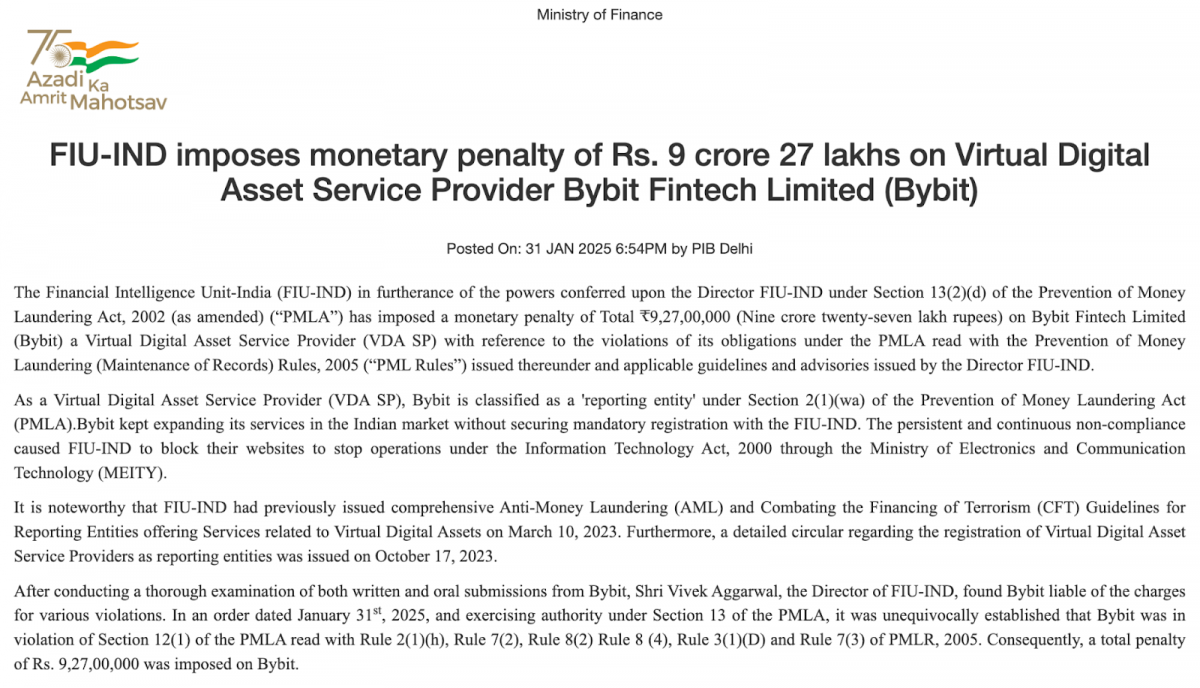The Cost of Non-Compliance: Bybit Faces a $1 Million Penalty in India
In Brief
Bybit's fine of ₹9.27 crore has brought attention to compliance issues in the cryptocurrency arena, emphasizing regulatory hurdles faced by exchanges in India and their global consequences.

The recent financial penalty imposed on Bybit by India's Financial Intelligence Unit (FIU-IND) has triggered considerable discussion surrounding compliance in the ever-evolving cryptocurrency landscape. This exchange was hit with a fine of ₹9.27 crore (approximately $1.06 million) for breaching the Prevention of Money Laundering Act (PMLA) along with related laws. This scenario not only highlights the regulatory challenges that crypto exchanges face in India but also carries significant implications for the entire global cryptocurrency industry.

Photo: Ministry of Finance
An Overview of the Regulatory Landscape
The PMLA, introduced in 2002, aims to combat money laundering and ensure that financial institutions uphold stringent compliance standards. Under this statute, Virtual Digital Asset Service Providers (VDASPs) such as Bybit are recognized as ‘reporting entities’ obliged to register with FIU-IND. The latest actions against Bybit signify the Indian government's commitment to enforcing compliance among cryptocurrency platforms.
In March 2023, the FIU-IND has laid down comprehensive guidelines for businesses that deal in virtual digital assets, emphasizing the necessity of robust anti-money laundering (AML) and counter-terrorist financing (CFT) protocols. A circular released in October 2023 reinforced these standards, mandating VDASP registration. Bybit's continuation of operations without this required registration led to the imposition of the fine and the subsequent suspension of its websites in accordance with the Information Technology Act.
Bybit Operations in India
Despite the absence of a government-issued license, Bybit, one of the largest cryptocurrency exchanges globally, has been actively expanding its offerings in India. This expansion includes a variety of trading options and financial products, which attracted a sizable user base. However, with increasing regulatory scrutiny, Bybit found itself at a critical juncture.
The investigation by FIU-IND revealed that Bybit fell short in meeting several key requirements outlined in the PMLA and its corresponding guidelines. Violations were identified in multiple aspects of the PMLA and the Prevention of Money Laundering (Maintenance of Records) Rules, 2005. Consequently, these findings prompted FIU-IND to swiftly act against Bybit, resulting in the hefty fine.
Implications of Non-Compliance
The repercussions of failing to comply are substantial for cryptocurrency exchanges operating within India. The suspension of Bybit’s websites effectively halted its operations in the country, impacting both the platform and its users. Existing customers were permitted to withdraw funds, but they could no longer engage in new transactions or access other services. This disruption illustrates how regulatory frameworks can greatly influence operational capacity in the cryptocurrency market.
Moreover, Bybit’s situation mirrors that of other notable exchanges, such as Binance and KuCoin, which have also faced regulatory challenges due to noncompliance with Indian laws. This trend suggests a broader initiative to clamp down on crypto platforms that do not adhere to local regulations.
Bybit Response and Future Prospects
In response to these developments, Bybit has taken steps to enhance its compliance record. The exchange has officially registered with FIU-IND and is currently pursuing a Virtual Digital Asset Service Provider (VDASP) license. This application process began on June 26, 2024, demonstrating Bybit’s proactive efforts to align with regulatory expectations.
Vikas Gupta, Bybit’s country head for India, expressed optimism about securing full operational licensing in the near future. This statement reflects an eagerness to work hand in hand with Indian authorities to resolve compliance issues and resume normal operations.
Despite facing significant challenges, such as service interruptions and public skepticism regarding its compliance status, Bybit is dedicated to navigating India’s complex regulatory framework. The exchange’s efforts to engage with regulatory bodies exemplify the importance of compliance in fostering trust within the crypto ecosystem.
India’s Regulatory Landscape
India has historically adopted a cautious stance towards cryptocurrency regulations, establishing stringent measures to deter criminal activities associated with digital assets. Financial regulators have intensified their scrutiny of cryptocurrencies due to concerns surrounding their potential use in money laundering and financing terrorism.
However, there are signs that India’s stance on cryptocurrencies might be evolving in response to global trends and domestic economic factors. Recent discussions among lawmakers indicate a willingness to reassess existing restrictions and possibly cultivate a more favorable environment for cryptocurrency innovation.
As nations around the world move towards more accommodating policies regarding cryptocurrencies, India could find itself at a crossroads between rigorous regulatory oversight and fostering an ecosystem conducive to technological advancement.
The $1 million fine levied against Bybit serves as a stark reminder of the critical importance of compliance within the cryptocurrency sector. As regulators worldwide tighten their hold on digital asset platforms, exchanges must make adhering to local laws a top priority to avoid severe penalties and operational disruptions.
Bybit’s ordeal illustrates the challenges that VDASPs face when navigating complex regulatory landscapes, as well as the potential for positive change through proactive engagement with authorities. As India refines its approach to cryptocurrency regulation, exchanges like Bybit will need to adapt swiftly while ensuring compliance with evolving requirements.
This event marks a pivotal moment for Bybit and the Indian cryptocurrency landscape, as stakeholders seek clarity amidst ongoing legislative transitions. The future success of crypto exchanges will heavily depend on their ability to meet regulatory demands while maintaining user trust in an increasingly controlled environment.
Disclaimer
In line with the Trust Project guidelines Please be aware that the information provided on this page does not constitute legal, tax, investment, financial, or any other type of advice. It's essential to invest only what you can afford to lose and to seek independent financial guidance if you have any uncertainties. For more information, we recommend reviewing the terms and conditions alongside the help and support resources provided by the issuer or advertiser. MetaversePost is committed to delivering accurate, unbiased reporting, but please note that market conditions can change without prior notice.







